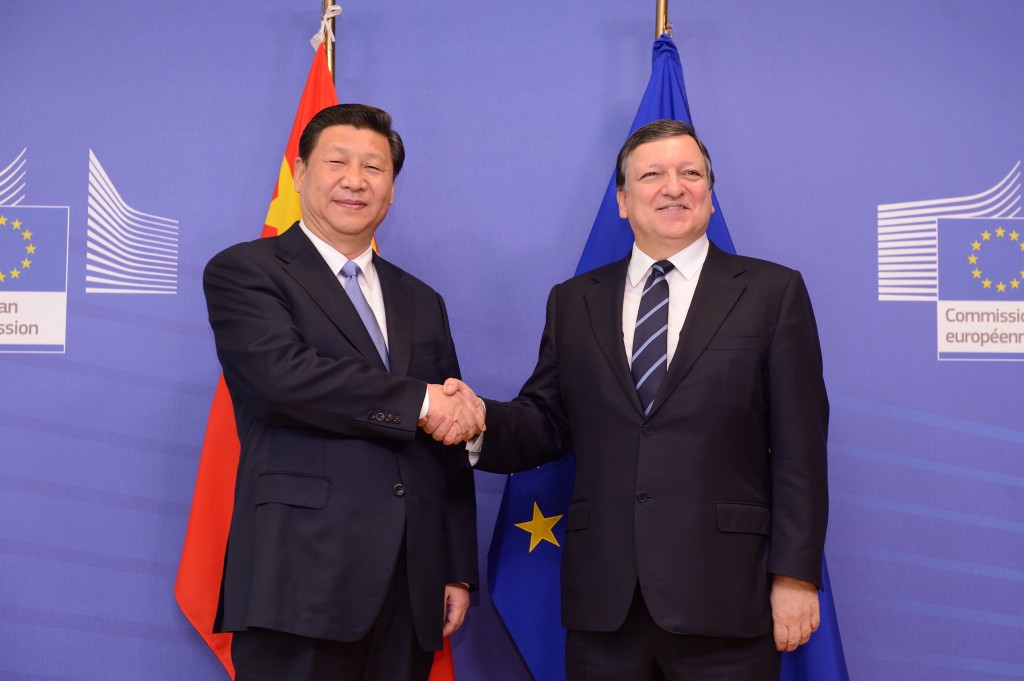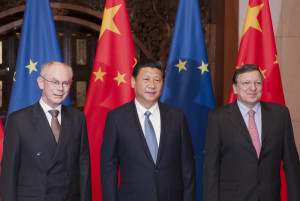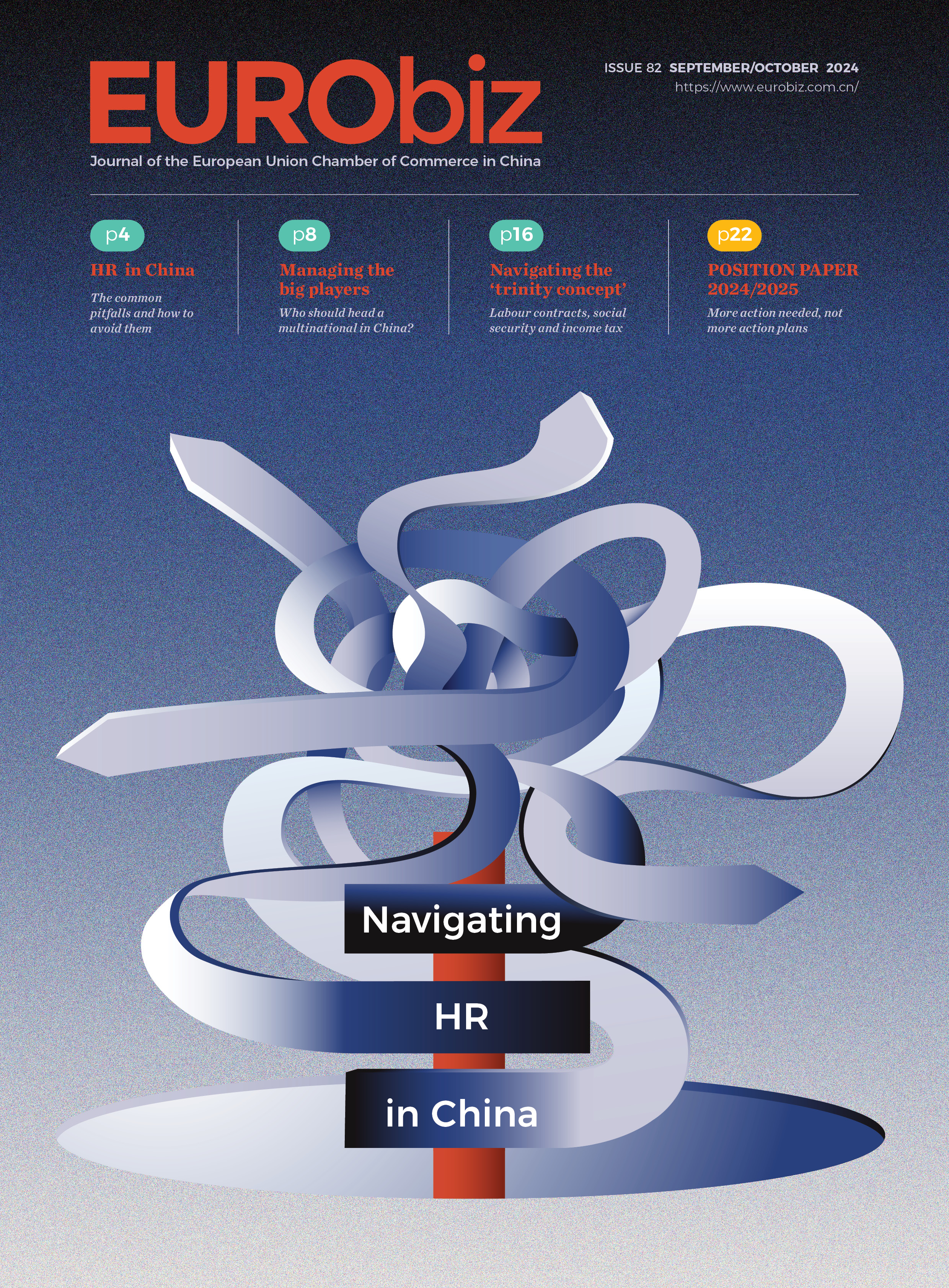Relations between the European Union and China have made significant advances in recent months. The negotiated settlement of trade disputes, the progress of the EU-China Bilateral Investment Agreement and President Xi Jinping’s visit to Europe all point towards a relationship that is steadily maturing as it continues to move forward. In this article Christophe Besse and Michal Makocki of the Trade Section, Delegation of the European Union to China, discuss these noteworthy developments.
Xi comes to Europe
Chinese President Xi Jinping’s visit to European institutions in Brussels on 31st March, 2014, was the first ever by a Chinese Head of State. It serves as clear recognition of the importance attached to EU-China relations. President Xi had the opportunity to meet with the Presidents of all three European Institutions, namely the Council, the Commission and the European Parliament. His visit to these institutions was part of a broader 10-day tour in Europe from 22nd March to 1st April, 2014, with stops in the Netherlands, Germany, Belgium and France, where he visited the UNESCO headquarters.
The visit had a large trade content with the aim of developing closer cooperation bilaterally and multilaterally, and this underlines, yet again, China’s intention to use relations with the EU as an important lever in a multipolar world.
The EU is China’s largest trading partner and China is the EU’s second largest. Our relationship is characterised by interdependence, maturity—and great potential. We are two deeply interdependent partners who are conscious of the great mutual benefit that interdependence has brought. China would not have achieved its impressive level of development without an open EU market, and the EU has also benefited from China’s growth, and we know that the future holds even more promise. By deepening our trade in services and our investment relations, we can both profit tremendously. In particular, EU technology, know-how, services and investment can decisively help China to achieve a more balanced, sustainable and socially inclusive model of growth—and to become a successful high-income economy.
The visit also allowed for progress on the urbanisation agenda, a priority area for the Chinese Government, and a field of enormous European expertise. China and the EU anticipate that this will be translated into concrete projects on the ground. Urbanisation is set to be one of the core engines of growth allowing China to redefine its economic model. The EU is committed to delivering effective projects and programmes that help to show ways ahead to Chinese decision-makers in all fields: from mobility to management of water resources, from environmentally friendly solutions to energy-saving buildings, from smart infrastructure to social services. We look forward to China providing the necessary access to the EU’s investment, goods, services, technology and ideas to bring these plans to fruition.
The key to turning all this potential into reality is a positive agenda of reciprocal openness and collaboration in the international arena. All these aspects were underlined in the EU-China Joint Statement issued during President Xi’s visit.
Resolving trade disputes adequately is an important part of a positive agenda. In the run-up to the visit, an amicable solution was found to the Chinese anti-dumping and anti-subsidy investigation concerning EU polysilicon, as well as the Chinese anti-dumping and anti-subsidy investigation concerning EU wine.
Back in July 2013, at the time when the solar panels case was settled through a price agreement, China had committed to provide all the space necessary for an amicable solution in the polysilicon and wine cases.
On polysilicon, intense discussions towards a price agreement have been going on between Chinese authorities and the EU exporter since February 2014. The European Commission has been closely associated with these discussions. On 18th March, 2014, the EU exporter and the Chinese authorities officially announced that an agreement had been found to settle the proceedings through a price undertaking, consisting of a specific minimum import price. As a consequence, China will not impose anti-dumping and anti-subsidy duties on polysilicon exports to China. This price agreement takes effect on 1st May, 2014, and lasts until the end of April 2016. The European exporter of polysilicon and the Chinese authorities have decided not to disclose the content and details of the agreement.
Concerning the wine case an ongoing business-to-business dialogue has been taking place between the European Wine Federation and the Chinese Wine Federation since November 2013, with the active support of the European Commission. In February 2014, the second meeting of this dialogue demonstrated that the two sides had a clear willingness to solve the dispute via discussion and cooperation. In February and March 2014, further intense discussions took place between the two federations to agree terms for a Memorandum of Understanding (MoU) aimed at sealing an amicable solution between the two parties through technical cooperation. Eventually, on 24th March, 2014, the two parties signed the MoU, the Chinese Wine Federation withdrew its anti-dumping and anti-subsidy complaint, and the Chinese Ministry of Commerce terminated the proceedings.
Finally, as a third pillar of this de-escalation process, both sides agreed to deepen their exchanges to solve the telecom equipment case, which was initiated by the EU (but not activated) in May 2013.
This new approach opens the door to a potential solution in the coming months. This is a testament to a shared commitment to find negotiated solutions to our trade disputes.
EU-China negotiations
The EU and China welcomed the progress made in the first two rounds of negotiations on an EU-China Investment Agreement covering investment protection and market access. The second round of the investment agreement negotiations, held from 24th to 25th March in Brussels, completed the conceptual exchanges on the main elements of a possible agreement. During the third round, that will take place in China, possibly in June, we envisage the initiation of text-based discussions.
Negotiating and concluding such a comprehensive EU-China Investment Agreement, covering investment protection and market access, will convey both sides’ joint commitment towards stronger cooperation as well as their willingness to envisage broader ambitions including, once the conditions are right, steps towards a deep and comprehensive Free Trade Agreement (FTA), as a longer-term perspective.
The EU strongly supports China’s swift participation in the WTO Trade in Services Agreement (TiSA) negotiation. Both the EU and China will step up their efforts to work towards the conclusion of the negotiations on the review of the WTO Information Technology Agreement (ITA). Both developments pave the way for more economic liberalisation in China.
Opening up is on the agenda
It may be worth mentioning at this point that trade and investment aspects took on unprecedented importance in this year’s sessions of the National People’s Congress (NPC) and the Chinese People’s Political Consultative Conference (CPPCC), both as a central instrument to achieve reform and as a pillar of foreign policy. Indeed in last year’s government work report, ‘opening up’ is listed as the government’s second overall priority for 2014, after reform. It is considered a fundamental, reinforcing complement to reform itself, and a crucial tool to enhance the competitiveness of the Chinese economy. Officially and explicitly mentioned at the top of China’s trade agenda are the investment negotiations with the EU and the US and FTA negotiations with Korea and Australia. Such strong political signals did not go unnoticed in Brussels.
In view of the great potential to improve their transport relations, both sides have decided to develop synergies between EU policies and China’s Silk Road Economic Belt initiative and to jointly explore common goals along these lines. European Union economic and transport corridors and the Silk Road Economic Belt have to be closely co-ordinated in order to make the flow of goods as efficient and mutually advantageous as possible. Economic collaboration can extend to infrastructure, trains, services and customs facilitation. The possibilities are deep and wide, and could help our partners in the region ensure geopolitical stability.
The European Commission acknowledges the invaluable input and support provided by the European Union Chamber of Commerce in China—truly the ‘business arm’ of the EU in China—in strengthening our political and economic relationship with China. The EU will continue to work hand in hand with the Chamber to further advance the ambitious trade and investment agenda with China, which just received a fresh presidential impetus.





Recent Comments